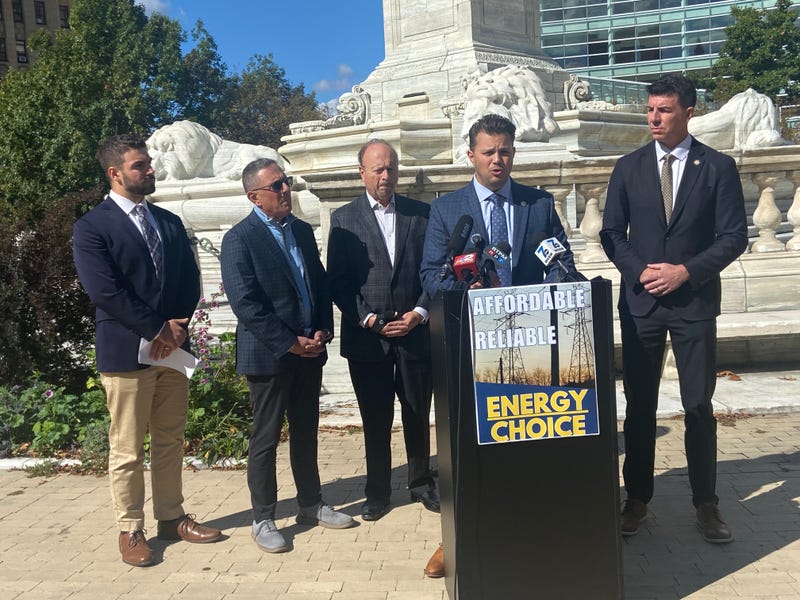
Buffalo, N.Y. (WBEN) - State Republican lawmakers joined home builders in calling on Gov. Kathy Hochul to impose a five-year moratorium on plans to require new builds to be all-electric in New York State.
Paul Bologna and Pat Chludzinski recently sent a letter to Gov. Hochul, joined by more than 20 State Assembly Minority Conference members, urging her to issue an Executive Order imposing a five-year moratorium on the benchmark deadlines tied to the Climate Leadership and Community Protection Act (CLCPA).
The letter cites major concerns about grid readiness, housing affordability, and energy reliability as the State moves to ban natural gas and impose zero-emission mandates on new construction and vehicle sales.
"The reality is New York’s electrical grid cannot safely or reliably handle the massive new demand these mandates will create," said Assemblyman Bologna. "We can’t rush headlong into electrifying every home, building, and vehicle when we lack the infrastructure and capacity to deliver that energy affordably or safely. Our constituents are being asked to pay more for less reliable service. The people we represent want to protect the environment — but they also want heat they can afford and homes they can buy. The current plan fails that basic test."
"While the intentions may have been good, the CLCPA was passed with no understanding of the impact its mandates would have on cost and delivery for residential and commercial customers, our electrical infrastructure, or our electric providers," said Assemblyman Chludzinski. "As negative consequences of these mandates like higher costs, lower reliability and denying consumer choice become more real, we are asking the Governor to delay implementation of what we know are unrealistic goals and deadlines. We need to go back to the drawing board and start over."
Industry leaders have also sounded alarms that the All-Electric Building Act (phasing out fossil fuel systems in most new buildings under seven stories beginning Jan. 1, 2026) and the Advanced Clean Car II Act (requiring 35% zero-emission vehicle sales by 2026) are unrealistic and economically damaging without major upgrades to transmission and energy storage systems.
Bologna and Chludzinski’s letter emphasize that "pretending we can outlaw natural gas and magically fix affordability, reliability, and the environment all at once isn’t just naïve — it’s reckless."
"We support a cleaner, stronger New York," Bologna added. "But we have to get this right. Rushing implementation without proper infrastructure will harm working families, small businesses, and the very environment these policies are supposed to protect."
Dominic Cortese of "Hammer Time Radio" on WBEN says New York is not ready.
"I had a listener call the other day crying on the air that she can't afford her electric bill now, and the representative from NYSEG who I had on the show that day said, 'Well, we have payment plans,' and this certainly may be something that might be convenient, but it doesn't speak to the problem, which is electrification is going to cost more money, and the utilities have to charge us more because they have to prepare the grid, the grid that is woefully inadequate," said Cortese.
Cortese says the mandates are not fair.
"This is the United States of America, and we should have a choice, and that choice should be ours as consumers as to what we want to do to power our homes, and we're having that choice be taken away from us as of Jan. 1, 2026, a brand new house has to be 100% electric," he said.
His bigger concern is what happens if there's a storm resulting in an outage.
"What are these people going to do? They're in a brand new house and they're being frozen out of it. Does this make any sense at all, instead of going forward as a society? To me, this is a big regression, because if we can't be comfortable in our own homes, then what can we have?" Cortese asked.
Phil Nanula of Essex Homes says this contradicts the state's goal of more affordable housing.
"Many people that are in favor of electric are saying that you can build houses cheaper with electric and run them cheaper with electric. Unfortunately, they're not builders. They're not the ones that need to do this. I can build electric houses anytime I want to go to build them five years ago. First of all, it's not what people want. But secondly, it's more expensive to build a house with electric. It costs between $10,000-to-$25,000 more in equipment cost, and it's 42% more costly to run your house with electric than gas, and that's from the US Department of Energy," Nanula explained.
Nanula says the governor wants builders to double the amount of permits in a year.
"She wants to go from 40,000-to-80,000 permits, 800,000 homes over 10 years. Every step we make to try to make houses more affordable, the state mandates such as this are causing us to raise our prices. We can never keep up with the amount of mandates that we're being required to meet," Nanula added.
